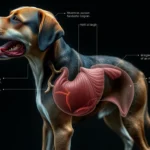
Caring for a dog is a rewarding yet challenging responsibility that requires attention to their health needs at different life stages. One of the critical aspects of dog health care is understanding when is a dog considered an adult. Knowing this milestone can greatly influence decisions regarding diet, exercise, and overall care. This article explores the various stages of dog development, the factors that determine adulthood, and the essential health care considerations for adult dogs.
Understanding Dog Development Stages
Puppy Stage
The puppy stage marks the beginning of a dog’s life, characterized by rapid growth and development. Puppies are typically born blind and deaf, relying heavily on their mothers for warmth and nutrition.
- Duration: From birth to approximately 6 months.
- Physical Characteristics: Puppies grow quickly, developing their teeth and beginning to explore their environment.
- Behavioral Characteristics: This stage is playful, curious, and sometimes chaotic, with puppies learning essential social skills through play.
Adolescence
Following the puppy stage, dogs enter the adolescent stage, which can be a challenging period for both dogs and their owners.
- Duration: Typically from 6 months to about 2 years, although this can vary by breed.
- Physical Characteristics: Adolescents continue to grow, often reaching their adult height, although they may still appear lanky or awkward.
- Behavioral Characteristics: This stage is marked by increased independence, potential rebelliousness, and heightened energy levels. Training during this phase is crucial to establish good behavior patterns.
Adulthood
The adulthood stage signifies a dog’s transition into maturity, where they are fully grown and their behavior stabilizes.
- Duration: Generally starts around 1-2 years, depending on the breed. Smaller breeds may mature faster, while larger breeds can take longer.
- Physical Characteristics: Adult dogs achieve their full size and weight. They may show signs of physical maturity such as a more defined musculature.
- Behavioral Characteristics: Adult dogs typically exhibit a calmer demeanor, reduced playfulness, and more consistent behavior as they settle into their roles within the family.
When is a Dog Considered an Adult?
Factors Affecting Adulthood
Determining when is a dog considered an adult involves several factors, including:
- Breed Size and Type: Smaller breeds often reach adulthood sooner than larger breeds. For instance, a Chihuahua may be considered an adult by 1 year, while a Great Dane may not reach adulthood until 2-3 years.
- Developmental Milestones: Physical growth, sexual maturity, and behavioral changes all play a role in assessing adulthood.
Signs Your Dog Has Reached Adulthood
Recognizing the signs that indicate your dog has reached adulthood can help you adjust their care accordingly:
- Physical Maturity Indicators: Look for consistent size and weight, along with a fully developed coat and adult teeth.
- Behavioral Changes: Signs include a calmer demeanor, decreased chewing on furniture, and a reduced need for constant play. Adult dogs are often more responsive to commands and training.
Common Myths about Dog Maturity
Many myths surround dog maturity, often leading to confusion among dog owners. One common myth is that all dogs mature at the same age. In reality, the maturity timeline varies significantly across breeds and individual dogs. Understanding these differences is key to providing the best care for your pet.
Health Care Considerations for Adult Dogs
With the transition to adulthood, several health care considerations come into play:
Nutritional Needs
As dogs mature, their nutritional needs change.
- Diet Transition: Adult dogs require a balanced diet specifically formulated for their life stage. This often means transitioning from puppy food to adult food, which typically has lower protein and fat levels.
- Importance of Balanced Diet: A well-balanced diet is crucial for maintaining optimal weight and overall health. Portion control becomes essential to prevent obesity, a common issue in adult dogs.
Regular Veterinary Check-ups
Routine veterinary visits are vital for adult dogs to maintain their health.
- Importance of Routine Health Screenings: Regular check-ups allow for early detection of potential health issues and ensure that vaccinations are up-to-date.
- Recommended Schedule for Vet Visits: Most veterinarians recommend annual check-ups for healthy adult dogs. However, older dogs or those with health issues may require more frequent visits.
Preventive Measures
Preventive care is essential for maintaining your dog’s health throughout adulthood.
- Spaying/Neutering Considerations: Spaying or neutering is highly recommended to prevent unwanted litters and can reduce the risk of certain health issues.
- Dental Care: Adult dogs are prone to dental disease, making regular dental check-ups and at-home dental care important for preventing periodontal disease.
Exercise Requirements
Adult dogs have specific exercise needs that vary by breed.
- Different Exercise Needs: Larger breeds often require more exercise than smaller breeds. Regular walks, playtime, and mental stimulation are crucial for keeping your dog healthy and happy.
- Importance of Mental Stimulation: Engaging your dog’s brain is just as important as physical exercise. Puzzle toys, training sessions, and interactive play can help keep your dog mentally sharp.
Common Health Issues in Adult Dogs
As dogs age, they can face various health challenges. Being aware of these issues can aid in early detection and treatment.
Obesity
Obesity is one of the most common health problems faced by adult dogs.
- Causes: Overfeeding, lack of exercise, and high-calorie treats can contribute to weight gain.
- Risks: Obesity increases the risk of serious health issues such as diabetes, heart disease, and joint problems.
- Prevention Strategies: Maintain a balanced diet and ensure regular exercise to help keep your dog at a healthy weight.
Arthritis and Joint Issues
Joint problems become more prevalent in adult dogs, especially in larger breeds.
- Signs to Watch For: Difficulty getting up, reluctance to play, and limping can indicate joint issues.
- Treatment Options: Consult your veterinarian for appropriate pain management and potential joint supplements.
Skin Conditions
Adult dogs may also experience skin issues due to allergies, parasites, or other factors.
- Common Skin Issues: Conditions like dermatitis, hot spots, and flea allergies can affect adult dogs.
- Preventive Care: Regular grooming and flea prevention can help minimize skin problems.
Heart Disease and Other Chronic Conditions
As dogs age, they become more susceptible to chronic health conditions.
- Importance of Early Detection: Regular check-ups can help catch issues like heart disease early, improving the chances of successful management.
- Regular Check-ups: Monitoring heart health through routine vet visits is crucial, especially for breeds predisposed to heart issues.
Transitioning from Puppy to Adult Care
Making the transition from puppy to adult care can be challenging but is essential for your dog’s ongoing health.
Adjusting Training Techniques
Continued training and socialization are vital for adult dogs.
- Importance of Continued Training: Adult dogs benefit from refresher courses on obedience and social skills. This helps reinforce good behavior and keep them well-adjusted.
Behavioral Expectations
Understanding adult behavior can aid in managing any issues that arise.
- Managing Aggression or Anxiety: If your adult dog shows signs of aggression or anxiety, consult a professional trainer or behaviorist for strategies to address these concerns.
Building a Routine
Establishing a consistent daily routine can help your adult dog feel secure.
- Consistent Schedule: Regular feeding times, exercise, and vet visits create a stable environment that promotes well-being.
Conclusion
In summary, understanding when is a dog considered an adult is crucial for making informed health care decisions. Recognizing the different stages of development and the unique needs of adult dogs will help you provide better care for your furry companion. Prioritizing regular health checks, a balanced diet, and preventive care can significantly contribute to your dog’s overall health and happiness.
Taking the time to understand your dog’s needs as they transition to adulthood will ensure they lead a healthy and fulfilling life.









